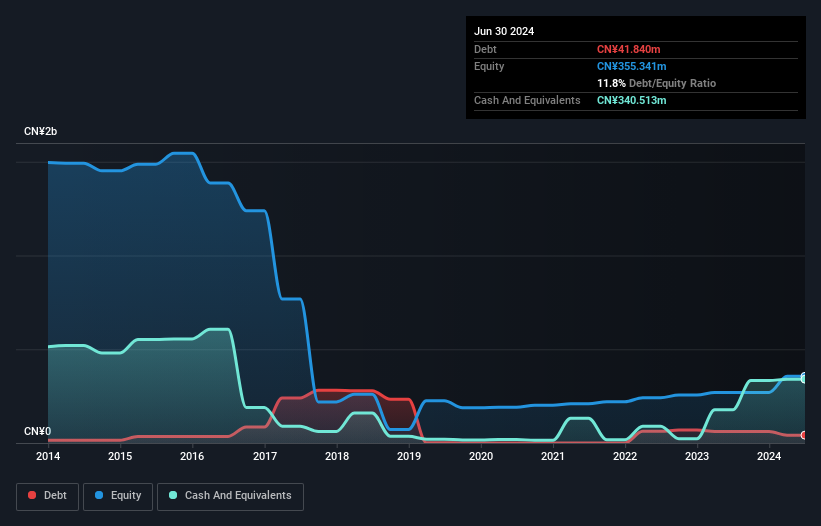Is Sanai Health Industry Group (HKG:1889) A Risky Investment?
Legendary fund manager Li Lu (who Charlie Munger backed) once said, 'The biggest investment risk is not the volatility of prices, but whether you will suffer a permanent loss of capital.' So it might be obvious that you need to consider debt, when you think about how risky any given stock is, because too much debt can sink a company. As with many other companies Sanai Health Industry Group Company Limited (HKG:1889) makes use of debt. But should shareholders be worried about its use of debt?
Why Does Debt Bring Risk?
Debt is a tool to help businesses grow, but if a business is incapable of paying off its lenders, then it exists at their mercy. Part and parcel of capitalism is the process of 'creative destruction' where failed businesses are mercilessly liquidated by their bankers. However, a more frequent (but still costly) occurrence is where a company must issue shares at bargain-basement prices, permanently diluting shareholders, just to shore up its balance sheet. Of course, debt can be an important tool in businesses, particularly capital heavy businesses. When we think about a company's use of debt, we first look at cash and debt together.
View our latest analysis for Sanai Health Industry Group
What Is Sanai Health Industry Group's Debt?
The image below, which you can click on for greater detail, shows that Sanai Health Industry Group had debt of CN¥41.8m at the end of June 2024, a reduction from CN¥61.8m over a year. But on the other hand it also has CN¥340.5m in cash, leading to a CN¥298.7m net cash position.

How Healthy Is Sanai Health Industry Group's Balance Sheet?
According to the last reported balance sheet, Sanai Health Industry Group had liabilities of CN¥86.7m due within 12 months, and liabilities of CN¥38.4m due beyond 12 months. On the other hand, it had cash of CN¥340.5m and CN¥13.7m worth of receivables due within a year. So it can boast CN¥229.1m more liquid assets than total liabilities.
This surplus liquidity suggests that Sanai Health Industry Group's balance sheet could take a hit just as well as Homer Simpson's head can take a punch. On this view, lenders should feel as safe as the beloved of a black-belt karate master. Succinctly put, Sanai Health Industry Group boasts net cash, so it's fair to say it does not have a heavy debt load! There's no doubt that we learn most about debt from the balance sheet. But it is Sanai Health Industry Group's earnings that will influence how the balance sheet holds up in the future. So if you're keen to discover more about its earnings, it might be worth checking out this graph of its long term earnings trend.
In the last year Sanai Health Industry Group had a loss before interest and tax, and actually shrunk its revenue by 46%, to CN¥98m. To be frank that doesn't bode well.
So How Risky Is Sanai Health Industry Group?
While Sanai Health Industry Group lost money on an earnings before interest and tax (EBIT) level, it actually booked a paper profit of CN¥13m. So taking that on face value, and considering the cash, we don't think its very risky in the near term. The next few years will be important as the business matures. When analysing debt levels, the balance sheet is the obvious place to start. But ultimately, every company can contain risks that exist outside of the balance sheet. For example Sanai Health Industry Group has 6 warning signs (and 1 which shouldn't be ignored) we think you should know about.
Of course, if you're the type of investor who prefers buying stocks without the burden of debt, then don't hesitate to discover our exclusive list of net cash growth stocks, today.
New: Manage All Your Stock Portfolios in One Place
We've created the ultimate portfolio companion for stock investors, and it's free.
• Connect an unlimited number of Portfolios and see your total in one currency• Be alerted to new Warning Signs or Risks via email or mobile• Track the Fair Value of your stocks
Try a Demo Portfolio for FreeHave feedback on this article? Concerned about the content? Get in touch with us directly. Alternatively, email editorial-team (at) simplywallst.com.This article by Simply Wall St is general in nature. We provide commentary based on historical data and analyst forecasts only using an unbiased methodology and our articles are not intended to be financial advice. It does not constitute a recommendation to buy or sell any stock, and does not take account of your objectives, or your financial situation. We aim to bring you long-term focused analysis driven by fundamental data. Note that our analysis may not factor in the latest price-sensitive company announcements or qualitative material. Simply Wall St has no position in any stocks mentioned.
免责声明:投资有风险,本文并非投资建议,以上内容不应被视为任何金融产品的购买或出售要约、建议或邀请,作者或其他用户的任何相关讨论、评论或帖子也不应被视为此类内容。本文仅供一般参考,不考虑您的个人投资目标、财务状况或需求。TTM对信息的准确性和完整性不承担任何责任或保证,投资者应自行研究并在投资前寻求专业建议。
热议股票
- 1
- 2
- 3
- 4
- 5
- 6
- 7
- 8
- 9
- 10